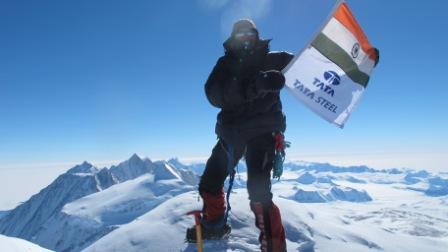
New Delhi, Jun 1: Ace woman mountaineer Premlata Agrawal has become the first Indian woman mountaineer to scale the seven continental peaks after climbing Alaska's McKinley Peak.
With this, she became the first Indian woman mountaineer to step on the highest peak of North America. She was felicitated for this momentous achievement on her return to India, here in the capital today.
On each of the seven continents, there is one peak that stands above the rest.
The Seven Summits present different challenges that have to be overcome with extreme and testing fortitude. Summiting all of them is regarded as one of the world's biggest mountaineering challenge.
Seven Summits has become the dream of many climbers, but only a select few have succeeded. Premlata now proudly belongs to this group.
"I am extremely proud to have accomplished this achievement on behalf of my country and all the women who live here with courage and determination. This experience has again taught me that if you have the will and focus, no matter where you come from, you can conquer the world," Premlata said.
The unassuming housewife worked towards her passion for heights starting at the age of 35 when she undertook the Dalma (hill) trek 13 years ago.
That was the starting point that led to the now famous Thar Camel Expedition, the ascent of Mt Kilimanjaro before setting foot on the world's highest peak, Mt Everest, on May 20.
Just before Premlata embarked on the ascent of McKinley Peak to cap off her seven continental peaks' successful climbs, the Government of India awarded her The Padmashree Honor for her trail-blazing achievements.
"Even when foul weather thwarted my initial attempt of planting my National Flag atop Mt Denali, my determination to climb this peak did not fizzle out; instead, it re-bolstered my will to start anew and ascend Denali," she said.
"What egged me on in overcoming the toughest of obstacles during my ascents was the fire covering my spirit to achieve in the form of our Tricolour wrapped around me, which, I have planted atop each of the seven Continental Peaks with the pride of being an Indian woman," she added.





Comments
Add new comment